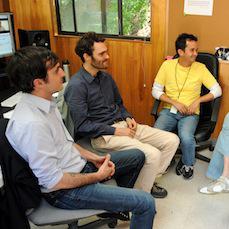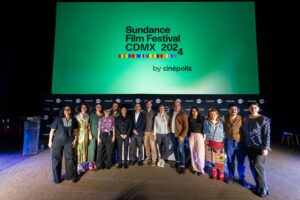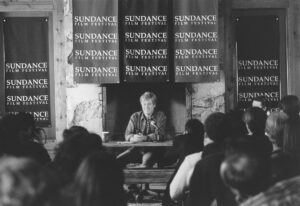Photo by Jill Orschel.
Nate von Zumwalt
In a genre of film so swamped with tales of injustice and corruption, the documenting of yet another enduring soul could feel almost stale-but it doesn’t. This refusal to perceive stories of discrimination as commonplace is what reiterates the undying need for documentary filmmakers.
When director/producer Michael Collins first heard about Paco Larrañaga’s wrongful death penalty conviction from producer Marty Syjuco who has a family connection to Paco, the story felt anything but ordinary. So Collins and Syjuco joined up with editor Eric Daniel Metzgar this past June at the Sundance Institute Documentary Edit and Story Lab to work on this project Give Up Tomorrow.
The getaway provided respite from a cramped editing room in New York City which was beginning to feel all too much like home. After countless praise, equal criticism, and various episodes of anxiety and doubt, the trio left Utah transformed and invigorated to finish their film.
Can you introduce the readers to Give Up Tomorrow?
Marty: Give Up Tomorrow is a feature documentary about a young man who was sentenced to death in the Philippines for a crime he absolutely did not commit. Paco Larrañaga has spent the last 13 years in prison after being framed by the police for the kidnap, rape, and murder of two sisters. The circumstances of the trial push the limits of one’s sense of reality.
The details of the case are gripping, but the universal message of the film is more important. Using Paco’s Spanish nationality (his father is Spanish), a grassroots movement attracted the support of the international human rights community, which culminated in the historic overturning of the death penalty in the Philippines.
How did you get involved in telling this story?
Michael: Paco’s brother-in-law (Marty’s brother) told me the situation and asked if I could make a web animation depicting some of the injustices Paco suffered during his trial. Before agreeing to this, I did as much research as possible.
The injustices I read about were shocking. I learned that Paco was 19 and had just moved to Manila when he was plucked from his life and put in jail where he had been for seven years at that point. The letter moved me to tears. I was the same age as Paco at that time and had moved to New York City seven years earlier. I felt an instant connection to him and a sense of responsibility to help him find justice. So Marty and I decided to take a leap of faith and soon found ourselves on our way to the Philippines armed with a new camera, some microphones, and filled with hope.
This film looks at how individuals fight against injustice. What do you hope viewers will take away from the film?
Eric: I hope that viewers come away with a sense of awe and hearty relief at how Paco and his family were able to maintain such integrity throughout their staggering ordeal. But the film is so dense, so full of misery and courage and other things, that people will inevitably take home their own cocktail of feelings. That’s the beauty of it.
Marty: I think the film will draw attention to entrenched systemic human rights abuses in the Philippines and will put a human face to the citizens of the Philippines whose lives are jeopardized daily by the breakdown of democracy.
You recently participated in the Doc Edit and Story Lab which supports filmmakers during the demands of postproduction. What was it like bringing your team to the mountains of Utah to have this space and support to work?
Michael: There was something surreal about the Lab at first, being in the middle of nature in all its glory surrounded by so many kind and nurturing people who were working tirelessly to help bring out the best in us, and in our film-it was somewhat jarring. Coming from the frenetic energy of New York City, from a dark edit room where we had been unnaturally holed up for far too long, it felt as if we had arrived on another planet. We were instantly filled with so much gratitude and it stays with us to this day.
Marty: There were moments when the feedback would fill us with anxiety and doubt, but when we were able to let go of our egos we saw that we were being pushed creatively way out of our comfort zones into places where incredible positive change could happen.
How did the Lab community of Creative Advisors and other Doc Lab Fellows impact your own work?
Eric: It is invariably inspiring to meet other documentary filmmakers. They warm my soul. To think of them chasing dissident bloggers across the hillsides of China, or putting Israeli judges on the spot, or embedding themselves with teenage soldiers in Afghanistan…all for the love of storytelling and justice-seeking. It’s magnificent. Being in their company gives me hope.
As for the Advisors, Mary Lampson reminded me to embrace the raw cuts, the non sequiturs. Kate Amend reminded me that less is indeed more. Laura Poitras reminded me that a dry scene doesn’t necessarily equate with a boring scene. Jean Philippe Boucicaut and Jean Tsien reminded me to play freely with the footage, even late into the process. Robb Moss reminded me to always stay tethered to the deeper meaning of the film.
Michael: It was after watching Mary Lampson’s presentation that we had our first major breakthrough. She shared clips from some of her early work and I felt the patience and space that she gave to each character and each and every shot- this was something that I had rarely experienced in docs.
What have you taken away from this intensive Lab experience?
Marty: We came home with a clarity of mind that we never would have found without the Lab. It was a truly transformative experience-one that we will look back on as a major milestone for the rest of our lives.
Michael: A tremendous gift I took from the Lab was an opportunity to clear my mind of these doubts, and return with confidence and clarity to our original intentions. During the Lab we were constantly challenged by the Advisors to reflect on the feelings that drove us to set out on this journey so many years ago. They forced us to step away from the footage at times and clear our heads-something that is nearly impossible to do at home, and what better place to do this than in the mountains of Utah.
Eric: Gratitude. Being there, I would occasionally stop and look around at all the Fellows and Advisors and Sundance staffers and experience a sense of victory. Most documentary filmmakers hole up in windowless rooms for months on end, going into debt in hopes of telling a worthy story. And at Sundance, a whole flock of us were lucky enough to convene in order to encourage each other, feed off each other, laugh and cry with each other, and remember why we decided to make these films in the first place.
How are you moving forward with Give Up Tomorrow?
Michael: Since the Lab we’ve been able to charge forward with renewed energy and focus. Challenges arise almost daily, as they do, but we are now able to face them and move on quickly, seeing them as adventures and opportunities to try something new, rather than as roadblocks [of] fear.




